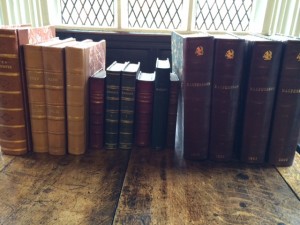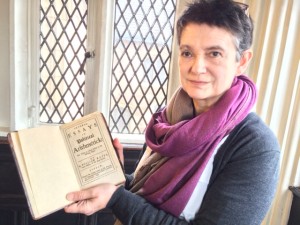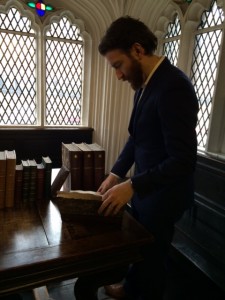Yesterday I was in the magnificent Chetham’s Library in Manchester with Colm O’Regan, recording a radio programme featuring the desk at which Karl Marx and Friedrich Engels studied for 6 weeks in the summer of 1845. The librarian Michael Powell set out for us the yard of books the two had read during that visit, saying they were very dull including for example William Petty’s [amazon_link id=”B00A1G5MHY” target=”_blank” ]Essays in Political Arithmetick[/amazon_link].

A yard of reading by Marx and Engels
Well, be still my beating heart! As the author of a brief (but affectionate) history of [amazon_link id=”0691169853″ target=”_blank” ]GDP,[/amazon_link] I was delighted to find it had been one of Marx’s early economics texts. Here I am holding the very copy that K.M. read (no marginalia, unfortunately). Rooting around on Google Scholar this morning, I find that Marx emphatically considered Petty to be the founding father of political economy, in [amazon_link id=”1840226994″ target=”_blank” ]Capital[/amazon_link] citing Petty’s description of capital as ‘past labour’. (Bizarrely, Google said it had witheld some search results because of data protection law – ??)

Me holding Petty
Here is Colm, metaphorically scratching his head about one of the other books, a super-dull history of trade since ancient times, in three volumes. More information about our podcasting project in the weeks ahead.

Colm O’Regan dipping into the history of trade
Marxian economics is a chasm in my education, although I did try to read Capital when young.[amazon_link id=”0140445684″ target=”_blank” ]Capital: Critique of Political Economy v. 1 (Classics S.)[/amazon_link] The [amazon_link id=”0141397985″ target=”_blank” ]Communist Manifesto[/amazon_link] is good and stirring stuff of course, and sitting in the Chetham’s Library, which could have served in a Harry Potter film, you understand why they had spectres in mind. However, for me Engels’ book, [amazon_link id=”0199555885″ target=”_blank” ]The Condition of the Working Class in England[/amazon_link], is one of the finest pieces of analytical economic reportage, and a true call to arms.
[amazon_image id=”0199555885″ link=”true” target=”_blank” size=”medium” ]The Condition of the Working Class in England (Oxford World’s Classics)[/amazon_image]
Update: the entire list of books read that summer by Marx and Engels, kindly provided by the librarian Michael Powell, is:
Aikin, John Description of the country from thirty to forty miles around Manchester (London, 1795)
D’Avenant, Charles Essays on peace at home and abroad (London, 1794)Discourses on the publick revenues and on the trade of England (London, 1698)
Eden, Frederick Morten The state of the poor, 3 vols. (London, 1795)
Gisbourne, Thomas Inquiry into the duties of men in the higher ranks and middle classes of society in Great Britain (London, 1795)
Macpherson, David Annals of commerce, manufactures, fisheries and navigation, 4 vols. (London, 1805)
McCulloch, John Ramsay The literature of political economy (London, 1845)
Petty, William Essays in political arithmetick (London, 1699)

Any more hints as to what the other books were?
Needless to say I didn’t notice the others, but will ask!
Thanks. Seems like they may have been taking a particular interest in the political arithmeticians since D’Avenant was also of that bent. It was he that published Gregory King’s findings, for instance.
The book by McCulloch, formerly first professor at UCL, was only just published if they were there in 1845 and is a huge bibliographic catalogue of past writings on economics. Marx didn’t think much of McCulloch. He called him “”the vulgariser of Ricardian political economy and simultaneously the most pitiful embodiment of its decline” and “this arch-humbug of a Scotsman”.
Serendipitously I came across Frederick Morton Eden in something I was reading yesterday. He and the book Marx and Engels were reading get a whole chapter in Richard Stone’s Some British Empiricists in Social Science 1650-1900. Stone seems to have thought highly of him and so, apparently, did Marx, who is quoted (Capital, Part VII): “Sir F. M. Eden is the only disciple of Adam Smith during the eighteenth century that produced any work of importance.” He was a socially conscious insurer, latterly friendly with Bentham, who financed and described a detailed survey of economic circumstances, especially budgets of the poor, in 181 parishes in the 1790s.
With this and the strong “political arithmetick” content of the other things they were looking at, it seems like they must have had a particular interest during their visit in finding historical empirical information on standards of living.
That’s fascinating. I’ve not heard of him before this. Thank you for the nugget. Chetham’s has other material on the Marx/Engels weeks in 1845 including the transcripts of the notes they were taking. Librarian Mr Powell a fount of information.
No Turner Macan “Shahnameh of Firdausi”, the Calcutta edition? Nor the copy of “The Arabian Nights” in Arabic he was given in Egypt? What of the writings of Morgan Kavanagh, with whom Marx shared a house in 1851? Malthus?Dr.Jeremy Taylor? They barely scratched the surface.